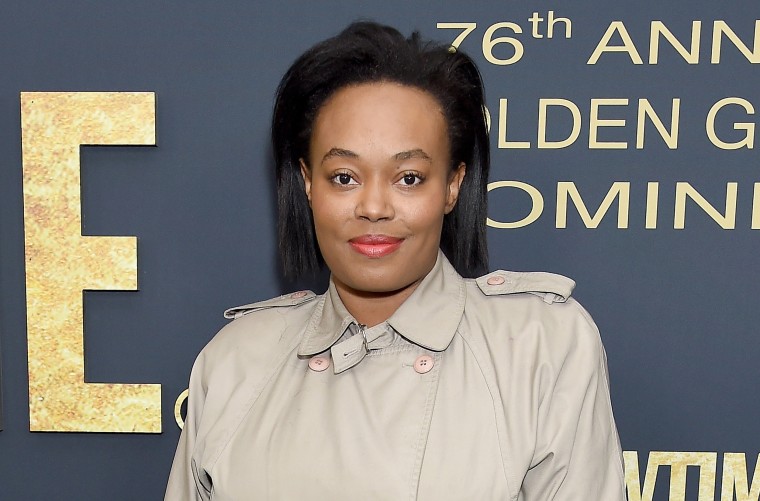In one of many standout scenes in Numa Perrier’s "Jezebel," Sabrina stands over her baby sister Tiffany to adjust a long and luxurious curly black wig, dubbed “Jezebel,” over her petite head.
Tiffany (flawlessly played by newcomer Tiffany Tenille) giggles and squirms. But as she catches a glimpse of herself in the mirror and starts to pose a bit, something in the 19-year-old awakens.
Her womanhood.
While there’s a playfulness and innocence to this intimate interaction, there’s also a slight sense of dread because that wig represents a door to a potentially dark world.
The film is set in the late 1990s and Tiffany and Sabrina (portrayed by Perrier herself) are coping with the death of their chronically ill mother. The family of four — which includes Sabrina’s white boyfriend, her brother and niece (played by Perrier’s daughter) — lives in a cramped weekly rental apartment in a gritty off-the-strip Las Vegas neighborhood. It’s time for Tiffany to pull her own weight and eventually move out, so she has to work as a “cam girl” in the early days of the internet, simulating sex over the computer for anonymous horny men.
This is the seedy job Sabrina set up for her.
For some viewers, Sabrina’s behavior reads as though she is grooming her little sister for a life as a professional phone sex girl. But for others, this story is about preparing a young woman with limited options on how to survive the despondent and sex work-entrenched streets of Sin City.
However, for Perrier, this is merely art imitating life. Growing up, she was Tiffany, and Sabrina was her older sister.
“I didn’t separate myself from the story, but finishing it wasn’t easy either. I wrote 15 pages of the script and then didn’t touch it for years,” Perrier told NBCBLK.
“I had to re-live and allow those emotions I had been numb to and memories I had stowed away, but I remember being at my birth mother’s house, with my sister in the next room, delving back into the script and I was remembering these moments, like ‘Yo, that was wild.’”
Adding an even extra layer of authenticity to her story, during the tight 10-day shoot for “Jezebel,” Perrier went back to her roots, filming in the same building she lived in during the late ‘90s. Surprisingly, the apartment hadn’t been remodeled since then, still having the same barren walls, dated appliances and furniture, and even that blue curly wire landline phone showcased in the opening scene of the film.
“Now our actual apartment wasn’t available, but we were in the same building and other than the flat screen mounted on the wall, it looked exactly the same,” Perrier said.
In terms of the film’s subject matter, for a director with less self-awareness and a gratuitous heavy hand, a story like “Jezebel” could have easily read as a cautionary tale in a Lifetime television movie. But Perrier practices “self-restraint,” rarely judging her characters or sensationalizing Tiffany’s complicated journey.
Given its microbudget (Perrier’s older sister Livia gave her seed money and she raised additional funds on GoFundMe), like most indies her labor of love is a little “bare bones,” she admits. But don’t be fooled, the storytelling in “Jezebel” is full of life. It’s adorned with emotion, grit and heart, but most importantly, it’s rich in creating spaces for black women’s sexuality to develop, expand and awaken on-screen, a rarity in film.
“Our sexuality has either been erased or looked at vulgar, so I wanted to show the power of black women being desirable and powerful and create a space for us to talk about it, enter and exit that space freely and wear sexuality on our sleeves, if we choose to,” she said.
When asked what encouraged her to become a filmmaker, Perrier quickly pointed to her childhood.
Born in Port-au-Prince, Haiti, Perrier, her sister and two brothers were adopted by her parents — “a black man and white woman from California” — who settled down in small towns across the country in states such as Washington, Oregon and Georgia. Perrier says they even lived on a farm for a few years.
“We didn’t watch a lot of TV back then, so the farm and its big open pastures were this great kind of resource. A fertile ground for my imagination, playing with the animals and making up stories,” she explains. “It was my canvas.”
While “Jezebel” may be her first feature film, over the years Perrier has been a storytelling force as the co-founder of Black and Sexy TV, a popular online web series network that boasted early work from the likes of Lena Waithe and Issa Rae. But as she and her co-creator and now ex-partner Dennis Dortch split up, Perrier has branched out on her own, making a name for herself.
“Jezebel” had an overwhelming response at its South by Southwest world premiere with three sold-out shows and a fourth “buzz” screening added. She had a supporting role as Elsie on the now canceled Showtime comedy “SMILF” and she’s also working on a thriller feature script about her own adoption story.
Perrier has also been tapped by none other than Ava DuVernay to helm an episode of the fourth season of the popular OWN drama "Queen Sugar" — an opportunity she recently referred to on Twitter as getting “the baton passed” to her.
“I am so excited and my episode is all black women. A black woman cinematographer Kira Kelly, a black woman writer Valerie Woods and me directing!” she said.
In this moment with the rise of black female directors in the industry, including Nia DaCosta ("Little Woods") and Tina Gordon ("Little") also dropping feature films this spring, Perrier has a distinct feeling that the abundance of “black girl magic” percolating in Hollywood right now isn’t a fad. It’s been there, and it’s here to stay.
“It’s our time. And it’s about damn time.”
Follow NBCBLK on Facebook, Twitter and Instagram
